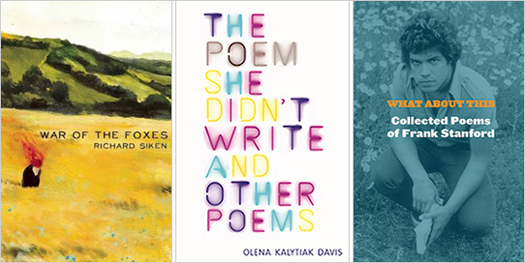In celebration of National Poetry Month, we’re offering a stupendously generous 20% OFF ALL POETRY TITLES this April. That means you still have one week to race down to Malvern Books and pick out some verse bargains—and to make your life a little easier, allow me to recommend this trifecta of recent arrivals from Copper Canyon Press…

Copper Canyon has been publishing poetry since 1972, and they’ve released over 400 titles. Their impressive list includes renowned and emerging American poets, poetry in translation, anthologies, and re-issues of classic collections. Let’s take a look at three of their outstanding new releases…
- War of the Foxes by Richard Siken
Siken is a painter as well as an acclaimed poet, and in War of the Foxes he contemplates the challenges artists and writers face when they seek meaning in their own inventions. This is a rich and thoughtful collection, and a worthy follow-up to the award-winning Crush, his much admired first book.
- The Poem She Didn’t Write and Other Poems by Olena Kalytiak Davis
We’re big fans of Alaskan poet Olena Kalytiak Davis (and in particular her wonderful first book, And Her Soul Out of Nothing), so this new volume of poetry, her first full collection in over ten years, is certainly cause for celebration. In his New Yorker review, Dan Chiasson writes that Davis’ poetry is “at once tawdry and oddly pure,” and suggests that what makes her work so thrilling is the way “it sends us ricocheting from line to line and poem to poem looking for sustenance.” If you’re keen for some brilliant, brutal, deeply intimate verse, be sure to check out The Poem She Didn’t Write…
It’s hardly surprising Frank Stanford has become something of a cult literary figure: he was prolific, enigmatic, and handsome, and he died young, shooting himself in the chest three times following an argument with his wife. However, he’s never quite reached legendary status, in part because his poetry has been hard to track down. Copper Canyon has now remedied this with a comprehensive new collection that includes work from each of Stanford’s published titles (including excerpts from his epic, “The Battlefield Where the Moon Says I Love You”), as well as an abundance of unpublished poems and fragments. What About This is a compelling introduction to a fascinating Southern poet.

 Were you forced to memorize lengthy bits of the
Were you forced to memorize lengthy bits of the